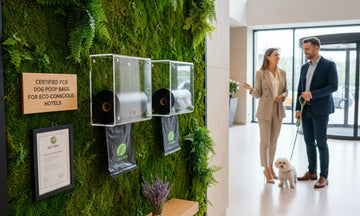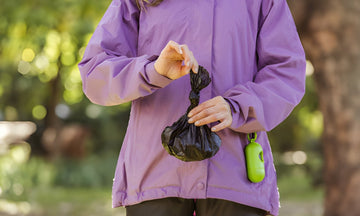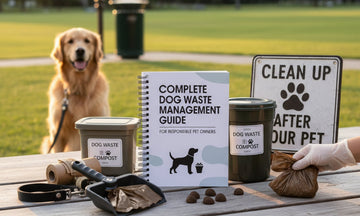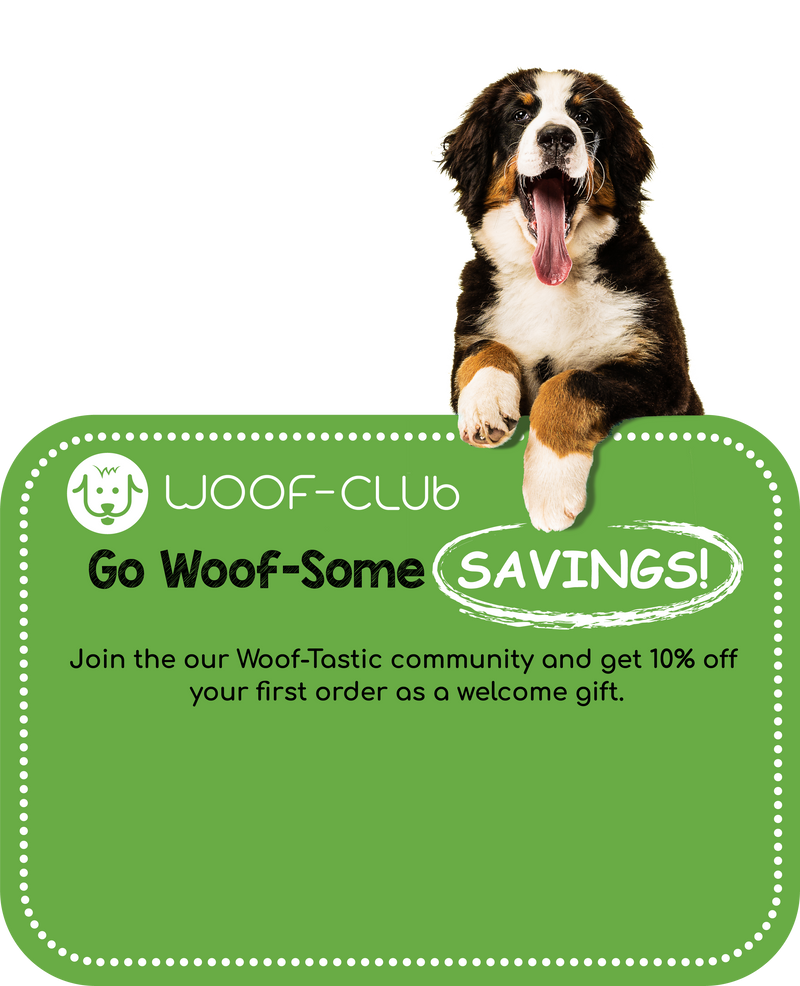Dogs are our best friends. As humans, they don’t take care of their hygiene by themselves. Therefore, we need to assist both them and ourselves in avoiding illness caused by dog feces. Dog waste contains bacteria and viruses that are harmful to both humans and dogs, unlike the friendly nature of dogs themselves.
A UK Health & Safety Guide for Dog Owners
You're out for a walk with your dog on a crisp morning, enjoying the fresh air, when your pup decides to do their business right in the middle of a busy sidewalk or park. It’s a kind of situation every dog owner is familiar with: reaching for a poop bag, hoping you have one handy, and wishing you didn’t have to deal with it at all. But not cleaning up after your dog is a health risk to you and your community.
As a dog owner, you've probably encountered this kind of situation more times than you can remember. Whether it's the possibility of treading on dog poop, the difficulty in managing it, or the possible risks associated with leaving it behind, dog waste is more than just an annoying task. It's a public health concern. In this guide, we’ll understand.
-
Why is it important to properly handle your dog poop?
-
How can you choose the perfect poop bags to make life easier and safer for yourself and others?
Understanding the Pathogens in Dog Poop
Your dog's excrement not only creates a mess for you to clean up, but it also has the potential to carry harmful pathogens. Dog waste can harbor various zoonotic diseases (diseases that transfer from animals to humans), making it crucial for dog owners to act fast and responsibly. These pathogens can easily spread with humans through contaminated surfaces, shoes, and hands, putting both you and your family at risk.
1. E. coli
Often linked to foodborne illnesses, this bacterium can cause stomach cramps, vomiting, and even kidney failure in severe cases.
2. Salmonella
A common cause of food poisoning symptoms is Salmonella. Handling dog waste without proper equipment, such as specialized dog poop bags, can make you sick.
3. Toxocara canis
This roundworm’s eggs can be transmitted through soil or contaminated surfaces, potentially causing eye or organ damage in humans, especially children. Here’s a quick overview of these pathogens and how they can affect your health:
Pathogen Transmission Route: Human Symptom
|
Pathogen |
Transmission Route |
Human Symptoms |
|
E. coli |
Hand → Mouth via contaminated surfaces |
Gastroenteritis, cramps |
|
Salmonella |
Handling without gloves |
Diarrhoea, fever |
|
Toxocara canis |
Ingesting eggs from soil |
Visceral/ocular larva migrans |
As a responsible dog owner, it’s important to understand that dog poop is not just a nuisance but a potential health issue. But if you are using the right tools and following the recommended hygiene practices, you can significantly reduce these risks.
High-Risk Locations & Exposure Scenarios

As a dog owner, you are probably aware that dog waste doesn’t just affect your backyard; it can pose a risk in many common places. Let’s think of some of the situations where you and your dog are most likely to encounter these risks.
-
Pavements and Sidewalks: How often have you had to deal with dog waste on a busy city street or in your local neighborhood? Without a proper waste bag, you risk exposing yourself and others to the bacteria and parasites that live in dog waste. backyard;
-
Public Parks and Playgrounds: These are areas where your dog may leave their mark, but more importantly, these are places where children often play. When you don’t clean up, it’s not just about your safety; it's about protecting others, especially young kids who are more likely to come into direct contact with contaminated surfaces.
-
Home Corners and Backyards: Sometimes, we’re guilty of leaving poop bags around the yard, thinking we’ll get to it later. But leaving waste unattended can attract pests and spread harmful bacteria throughout your living space.
Legal Requirements & Local Bylaws in the UK
As a dog owner, you're probably familiar with the rules when it comes to cleaning up after your dog, but just in case you need a reminder: failure to pick up after your dog can result in hefty fines. Different regions have different regulations, and knowing them can help you avoid fines while maintaining public health standards.
|
Region |
Minimum Fine |
Common Enforcement Body |
|
England & Wales |
£80 (up to £1,000) |
Parish/Town Councils |
|
Scotland |
£40 (up to £500) |
Local Authorities |
Fines aside, there’s also the issue of responsibility. As a dog owner, you are responsible for making sure your pet’s waste doesn’t become a public health hazard. Having the right poop bags with you at all times is a simple way to avoid penalties and keep your environment clean.
Pro Tip: Carry a poop bag on every walk, and make sure to dispose of it properly. Not only will it keep you from fines, but it will also keep you and your community safe.
Choosing and Using the Right Dog Poop Bags

You already know that cleaning up after your dog is non-negotiable, but the quality of the poop bags you use can make a giant change in your day-to-day life. Having the right dog poop bag can turn your annoying task into a quick and satisfying one! Additionally, it guarantees the safety and cleanliness of your surroundings.
Let’s look at the different options available:
1. Thickness
The thicker the bag, the less likely it is to tear or leak, which is important for your safety.
2. Leak Proofing
Leakproof bags ensure no bacteria or parasites can escape during the handling of dog poop.
3. Easy Open Design
The easier the bag is to open, the less hassle you’ll have, especially when your dog is anxious to continue the walk. Here’s a handy comparison of different types of bags you might come across.
If you are interested in buying a dog poop bag, please click here.
Feature Standard Bags Biodegradable Bags Compostable Bags:
|
Feature |
Standard Bags |
Biodegradable Bags |
Compostable Bags |
|
Thickness (mm) |
0.5 |
0.8 |
0.7 |
|
ASTM D6400 Certified |
No |
No |
Yes |
|
Clip-on Dispenser Compatible |
Yes |
Yes |
Yes |
Best Hygiene Practices After Cleanup

As a dog owner, it's important to follow proper hygiene practices after you’ve cleaned up your dog’s waste. These small steps can help prevent the spread of harmful germs.
Handwashing
After handling the dog waste, wash both your hands with soap and warm water for at least 20 to 30 seconds.
Disinfecting Shoes and Reusable Dispensers
You should clean your shoes and poop bag dispensers (if used) after every walk to avoid tracking bacteria into your home.
Safe Storage of Used Bags
If you are unable to dispose of the bag right away, please store it in a secure, sealed container until a waste bin is available.
Breaking Announcement: Woofpanion Unveils the Best Dog Poop Bags Ever!
Why do biodegradable and compostable options matter?

As more dog owners look to reduce their environmental footprint, biodegradable and compostable poop bags are becoming a popular option. Traditional plastic bags can take 20 to hundreds, or even thousands, of years to decompose! adding to the plastic waste problem.
Biodegradable Bags
These bags break down in the soil quite early, within just months, making them a better choice for you and your environment.
Compostable Bags
Fully compostable bags can break down into organic material, making them an even better alternative.
By switching to biodegradable or compostable poop bags, you're helping reduce plastic pollution and doing your part for the environment around you.
It’s about protecting yourself, your family, your community, and your environment from harmful diseases. With the right tools, such as high-quality poop bags, you can make the process safer, quicker, and more hygienic.
Conclusion
Explore the Woofpanion range of dog poop bags, designed specifically for UK conditions. With leak-proof, easy-to-use, and environmentally friendly options, we’ve got you covered on every walk. Make sure you're always prepared.

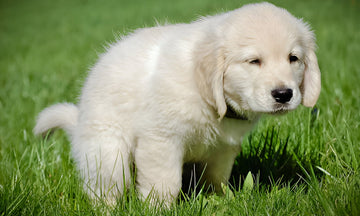
'/%3E%3Ccircle cx='60' cy='45' r='18' fill='%23f4c2a1'/%3E%3Cpath d='M42 75 Q60 90 78 75 Q78 95 60 100 Q42 95 42 75' fill='%23f4c2a1'/%3E%3Cpath d='M45 40 Q60 25 75 40 Q75 35 60 30 Q45 35 45 40' fill='%23d4a574'/%3E%3Ccircle cx='52' cy='50' r='2' fill='%23333'/%3E%3Ccircle cx='68' cy='50' r='2' fill='%23333'/%3E%3Cpath d='M55 58 Q60 62 65 58' stroke='%23333' stroke-width='1.5' fill='none'/%3E%3C/svg%3E)
